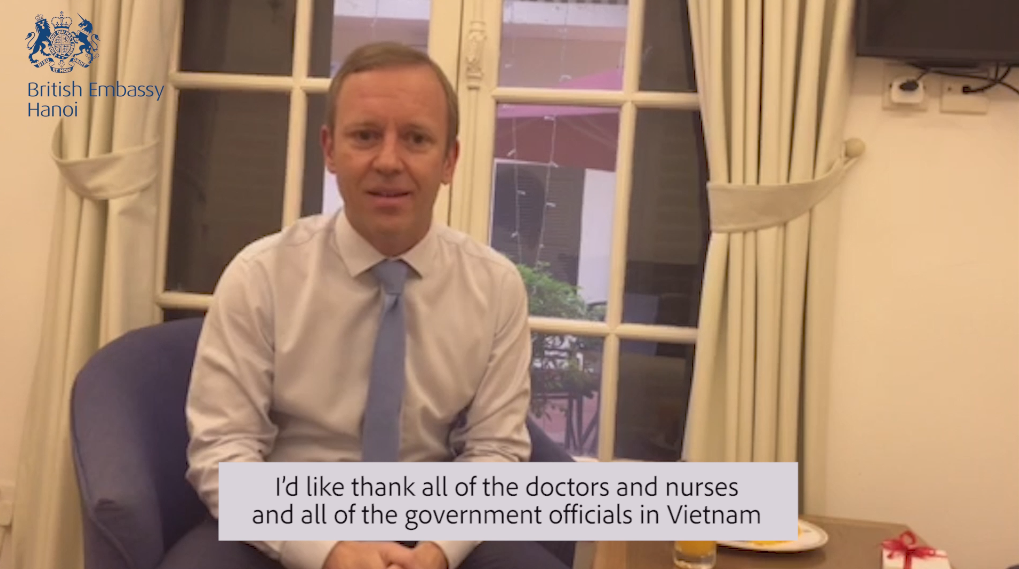One year ago, I first realised that COVID-19 would significantly disrupt all of our lives.
My wife flew from London to Hanoi, and several days later she was contacted about several positive cases on her flight. She went into isolation for two weeks (luckily, she was not infected). I have to admit that what seemed a very strict response then, now seems a sensible and normal public health measure. We have all spent the last year tracking infection rates, virus mutations and struggling to accept the terrible number of deaths around the world.
But now, there is a new story of hope to tell in the Year of the Ox. Science is winning this battle with the virus. Just today, February 24, the first batch of a vaccine designed by Oxford University and AstraZeneca was delivered to Vietnam.
It was January 2020 when Chinese scientists made the genetic code of COVID-19 publicly available. Scientists in Oxford (UK) were ready to respond. They had been planning for years for how to use an existing safe and effective vaccine platform to respond to Disease X – the next big pandemic. Some 11 months on, this vaccine has passed through rigorous clinical trials and been approved by the UK regulator.
Recently, it was also approved by the World Health Organisation for global distribution. Traditionally, vaccines have taken a decade to develop and deploy. The speed at which the Oxford/AstraZeneca vaccine, and several others, have been developed is a triumph of science and innovation. It is the outcome of a global effort underpinned by dedicated clinicians, researchers, front-line workers and significant government investment.
The next challenge is to ensure that robust supply chains and delivery infrastructure are in place to undertake mass vaccination around the globe. International co-operation is required on a scale never seen before to ensure that countries with fewer resources are not left behind. This is not only the right thing to do, but critical to preventing a country without access to vaccines becoming a hotspot that could fuel future outbreaks or mutations of the virus.
When it comes to this pandemic, no country will be safe until all countries are safe. This is why the UK is one of the top donors to COVAX, the global multilateral mechanism led by the World Health Organisation to help all countries access a COVID-19 vaccine.
Alongside pledging £548 million in funding, as chair of the G7, the UK has committed to donating the majority of surplus vaccine doses to COVAX. This will help ensure vaccines reach even more priority and vulnerable populations.
Vietnam is already set to receive Oxford/AstraZeneca vaccine doses via COVAX. This past week, Vietnam announced the priority list for COVID-19 vaccinations and is working at impressive speed to deliver its plans to immunise 80 percent of its population with international and domestically produced vaccines.
Early data indicates that vaccines are helping us to fight back against COVID-19.
In the UK, over 17 million people have received at least one vaccine dose, with plans to vaccinate all adults by the end of July 2021. The number of new COVID-19 cases, hospitalisations and deaths in the UK are falling. The UK is prioritising older and medically vulnerable groups, alongside healthcare and frontline workers. I feel relieved that my parents have had their first vaccine dose.
While vaccines will form an important part of the global COVID-19 recovery strategy, it is unlikely that we will entirely eradicate the virus. There will be challenges ahead. To maintain the efficacy of vaccines, it’s essential to identify and report new variants of the virus as soon as possible.
Throughout the pandemic, the UK has shared more genomic data with global scientific platforms than any other country, including vital sequencing on the variant B1.1.7, first identified in the UK. We believe that transparent sharing of data will boost global capacity to modify vaccines in response to new variants.
Vietnam is playing its part. Oxford University Clinical Research Unit (OUCRU) is working with Vietnam’s Hospitals of Tropical Diseases in Hanoi and Ho Chi Minh City on genome sequencing. It was doing this even before the pandemic and we hope to continue collaboration in this area.
Vaccines have the greatest overall impact when they are administered to at least 80 percent of a population. Vaccine hesitancy, when people refuse or are reluctant to be vaccinated, may reduce the efficacy of COVID-19 vaccines.
The UK is working alongside Vietnamese research institutions to support global efforts to tackle vaccine hesitancy and ensure that everyone has accurate and scientifically supported information to make informed decisions about their health.
Looking further ahead, the tough reality is that COVID-19 is not the only threat we are facing to global health security. Diseases transferred from animals to humans represent 75 percent of all emerging infectious diseases, and within the last two decades have also caused outbreaks of SARS, H1N1, MERS and Ebola. We also know that Anti-Microbial resistance (where drugs, especially those against bacteria, are becoming less effective) is caused by over-consumption of antibiotics in humans and animals.
That is why we need a ‘One Health’ approach, which encompasses human, environmental and animal health. The UK has co-operation programmes to support Vietnam to expand pathogen surveillance, ensure meat production is sustainable, and prevent illegal wildlife trade.
Vietnam has done an impressive job to suppress COVID19 and reduce impact on the health and livelihood of the Vietnamese people. In the Year of the Ox, we can ensure that vaccination overpowers the virus. Working in international partnerships, the UK and Vietnam can make a contribution to global health security, scientific innovation and sustainable growth.
Like us on Facebook or follow us on Twitter to get the latest news about Vietnam!




















































